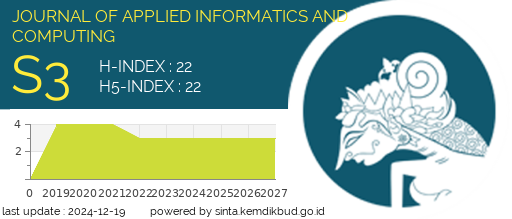Design and Development of a Mobile-Based Water Reminder Application on the iOS Platform
DOI:
https://doi.org/10.30871/jaic.v7i2.5339Keywords:
Reminder, Drinking Water, Mobile iOS, Eight Golden Rules of Interface DesignAbstract
Lifestyle encompasses the various ways in which individuals, groups, and nations are influenced by geography, economy, politics, history, culture, and religion. It reflects the characteristics of residents, including their daily behaviors in work, activities, and health. Maintaining a healthy lifestyle is crucial for overall well-being, and one key aspect is ensuring an adequate intake of water. Water constitutes the primary component of the human body, comprising an average of 70-80 percent of an individual's body weight. Factors influencing water consumption behavior include knowledge and preferences for other beverages. To address the challenge of promoting water consumption and advocating for its importance, this study proposes the development of a mobile application system capable of reminding individuals to drink water based on personalized needs, considering factors such as gender, age, weight, height, and activity level. The research aims to leverage and advance existing technology, specifically by creating a mobile application on the iOS platform. The objective is to enhance and reinforce individuals' discipline in maintaining proper water intake. Targeting users from middle-class to affluent social conditions, the application is tailored for the iOS platform. The study involves testing the functionality of the water reminder system software developed for mobile devices running on the iOS platform. The ultimate goal is to create an information system that not only exhibits maximum aesthetics and functionality but also adheres to the principles of interface design, including the application of the eight golden rules.
Downloads
References
Ferreira, Luana Karoline. Meireles, Juliana Fernandes Filgueiras. Ferreira, Maria Elisa Caputo. (2018). Evaluation of lifestyle and quality of life in the elderly: a literature review. Rev. Bras. Geriatr. Gerontol., Rio de Janeiro, 21(5): 616-627.
Didinkaem. (2006). "Berapa Banyak Harus Minum Setiap Harinya"
Briawan D, Hardinsyah, Marhamah, Zulaikhah, Aries M. 2011. Konsumsi Minuman dan Preferensinya pada Remaja di Jakarta dan Bandung. Gizi Indon. 34(1):43-51.
Irawan MA. 2007. Konsumsi Cairan dan Olahraga. Polton Sports Science Performance Lab. (1): 2-8.
Hardinsyah, Briawan D. 2009. Studi Kebiasaan Minum dan Status Hidrasi pada Remaja dan Dewasa di Wilayah Ekologi yang Berbeda. Bogor : IPB.
Kurniawan, Anggoro Yudha. (2014). Pembuatan Aplikasi Calorie and Water Berbasis Android. Skripsi, AMIKOM Yogyakarta.
Lee, Nam Eui. Lee, Tae Hwa. Seo, Dong Heui. and Kim, Sung Yeon. (2015). A Smart Water Bottle for New Seniors: Internet of Things (IoT) and Health Care Services. International Journal of Bio-Science and Bio- Technology, volume 7, pp.305-314.
Monita, Nurhayati. (2017). Hubungan Aktivitas Fisik, Pengatahuan Air Minum Asupan Air dan Gejala Dehidrasi dengan Kecukupan Air pada Pekerja. Skripsi, Institut Pertanian Bogor.
Nizar, Muhammad Afdi. (2015). Kelas Menengah (Middle Class) dan Implikasinya bagi Perekonomian Indonesia, Jakarta.
Notoatmodjo, S. (2003). Pendidikan dan Perilaku Kesehatan. Rineka Cipta. Jakarta.
Rosa dan Muhammad Shalahudin. (2016). Rekayasa perangkat Lunak Terstruktur dan Berorientasi Objek. Bandung: Informatika Bandung.
Shneiderman, B. (2000). Designing the user interface. 3rd edition. Wokingham: Addison Wesley.
Salbino, Sherief. (2015). Buku Pintar iPad & iPhone Untuk Pemula. Jakarta: Kuncikom.
Shani, Agrista Sarfina. (2017). Sistem Aplikasi Water Reminder Berbasis Android, Universitas Muhammadiyah Surakarta.
Vithani, T. Member. IAENG. and Kumar, Anand. (2014). Modeling the Mobile Application Development Lifecycle, Hong Kong.
Downloads
Published
How to Cite
Issue
Section
License
Copyright (c) 2023 Supardianto Supardianto, Devi Mandasari

This work is licensed under a Creative Commons Attribution-ShareAlike 4.0 International License.
Authors who publish with this journal agree to the following terms:
- Authors retain copyright and grant the journal right of first publication with the work simultaneously licensed under a Creative Commons Attribution License (Attribution-ShareAlike 4.0 International (CC BY-SA 4.0) ) that allows others to share the work with an acknowledgement of the work's authorship and initial publication in this journal.
- Authors are able to enter into separate, additional contractual arrangements for the non-exclusive distribution of the journal's published version of the work (e.g., post it to an institutional repository or publish it in a book), with an acknowledgement of its initial publication in this journal.
- Authors are permitted and encouraged to post their work online (e.g., in institutional repositories or on their website) prior to and during the submission process, as it can lead to productive exchanges, as well as earlier and greater citation of published work (See The Effect of Open Access).











